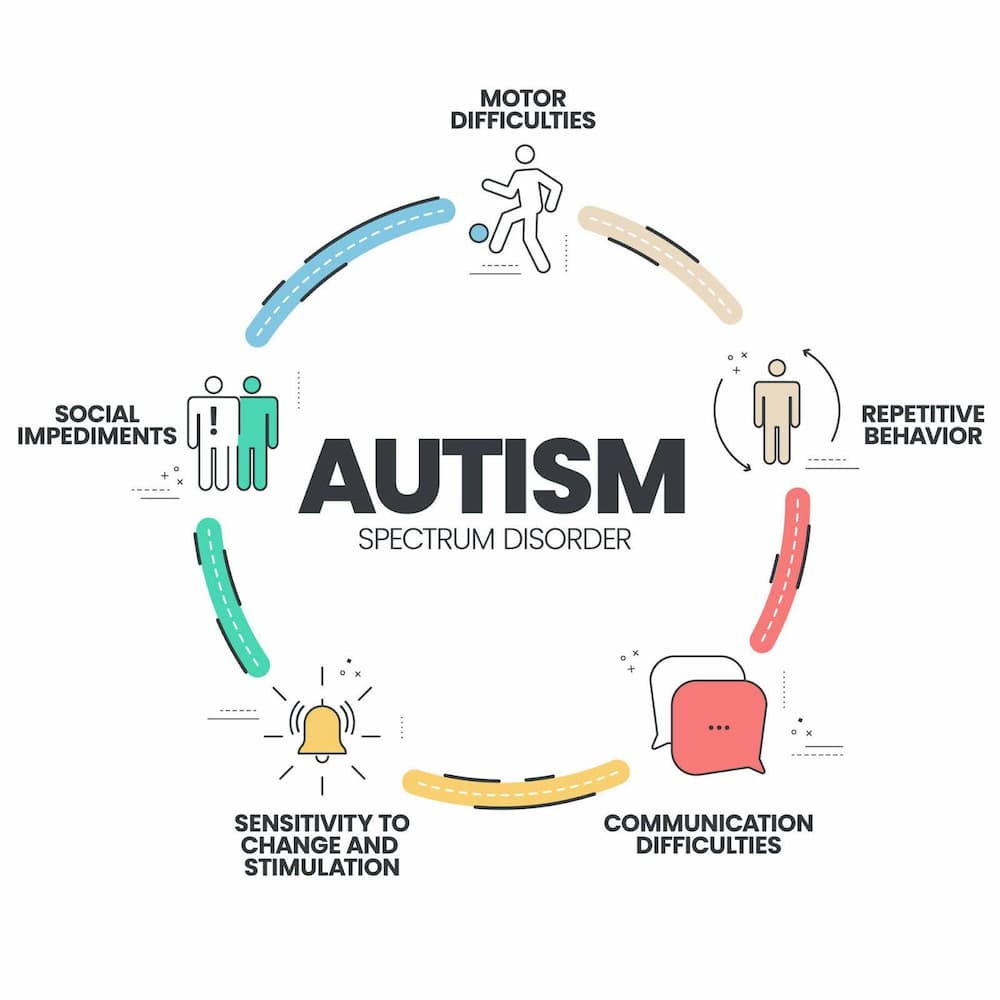Signs it’s time your family needs Autism Behavioral Therapy intervention
Signs it’s time your family needs Autism Behavioral Therapy intervention
Blog Article
Understanding the Impact of Behavioral Autism on Daily Life and Social Communications
You might not realize just how deeply behavioral autism affects day-to-day life and social interactions. Individuals on the spectrum commonly navigate a world filled with communication hurdles and sensory overload. These challenges can lead to disappointment and seclusion, affecting their connections and general well-being.
Specifying Behavioral Autism and Its Features
Behavioral autism, often described as autism spectrum problem (ASD), includes a variety of problems characterized by obstacles in social communication, interaction, and repetitive behaviors. You might see that people with ASD frequently struggle to interpret social hints, which can result in misconceptions in conversations. They might find it tough to develop eye call or take part in small talk, making social circumstances really feel frustrating.
Interaction troubles can show up in different means, from delayed speech development to a choice for using fewer words. Repeated habits, such as hand-flapping or shaking, can act as coping systems to take care of stress and anxiety or sensory overload. These features can profoundly affect life, making it important for you to understand and support those with ASD. By acknowledging these qualities, you can foster an environment that advertises approval and encourages reliable interaction, aiding individuals with autism flourish in their day-to-day communications.
The Range of Autism: Comprehending Variability in Habits
Autism spectrum disorder (ASD) isn't a one-size-fits-all medical diagnosis; it varies widely amongst people. You may run into people that are very verbal and involve quickly in discussions, while others could favor solitary activities or communicate non-verbally.
Moreover, the means people with ASD reply to sensory input can differ substantially; some could be bewildered by bright lights or loud sounds, whereas others prosper in stimulating environments. The spectrum also consists of differences in social communications; some individuals may struggle to translate social cues, while others browse social setups with loved one ease. Comprehending this irregularity is necessary, as it assists you value everyone's distinct experience and dressmaker assistance to their details requirements, fostering a much more inclusive setting for everybody.
Communication Difficulties Encountered by People With Autism
When you engage with individuals on the autism spectrum, you might notice their distinct communication challenges. They often deal with problems with both nonverbal and spoken signs, which can influence their social communications. Comprehending these obstacles is crucial for cultivating much better links and assistance.

Verbal Communication Problems
Numerous individuals on the autism range experience verbal communication troubles that can substantially affect their day-to-day communications. You could locate it testing to reveal your thoughts, feelings, or requires clearly. This can result in aggravation for both you and those around you, as misunderstandings occur. You might deal with initiating conversations, maintaining a topic, or understanding nuances in speech. Typically, you may like utilizing simple language or recurring expressions, which can limit your capability to participate in deeper discussions. Your rate, quantity, or tone might not align with social expectations, causing others to misinterpret your intents. Acknowledging these difficulties can help you and your assistance network develop strategies to enhance interaction and promote much better links with others in your day-to-day live.
Nonverbal Communication Obstacles
Verbal communication isn't the only obstacle people on the autism range face; nonverbal communication obstacles can be simply as considerable. These obstacles can lead to misconceptions or misinterpretations of social hints, making interactions feel complicated or overwhelming. By resolving nonverbal interaction, you can discover techniques to enhance your social experiences and improve your overall top quality of life.
Social Communication Effects
Social interactions can usually really feel frustrating as a result of the distinct interaction challenges encountered by individuals with autism. You may battle with interpreting social hints, making it difficult to comprehend sarcasm or body movement. This can cause misunderstandings or awkward minutes in conversations. Additionally, initiating and keeping conversations may feel challenging, triggering stress and anxiety in social situations. You might favor organized atmospheres, making spontaneous interactions uncomfortable. It's likewise usual to experience problem in engaging in little talk, which can prevent developing brand-new relationships. Acknowledging these challenges can aid you discover approaches to boost communication, such as practicing social skills in safe setups or making use of visual aids - Autism Therapist. Comprehending your needs permits you to navigate social interactions with better self-confidence and ease.
Social Communication and Connection Building in Autism
While structure relationships can be testing for individuals with autism, recognizing their one-of-a-kind viewpoints and communication designs can promote purposeful links. You may notice that many individuals on the range prefer straight communication and may battle with social signs or little talk. By being uncomplicated in your communications, you can assist develop an atmosphere where they really feel comfortable.
Engaging in shared passions can also serve as a bridge to deeper links. Whether it's a pastime, a favorite show, or a common interest, these usual strings can open doors to relationship.
Every Day Life Routine: Navigating Difficulties and Techniques
Maneuvering day-to-day life routines can be particularly testing for individuals with autism, specifically when unanticipated changes occur. You could find convenience in having an organized timetable, as it assists you anticipate what's following. It's normal to really feel anxious or overwhelmed when interruptions happen. To browse these obstacles, think about applying visual timetables or lists. These devices can provide quality and reassurance.
Establishing a routine that includes sensory breaks can also be valuable. This assists develop an understanding environment.
Last but not least, method mindfulness methods to take care of anxiety and anxiousness. Straightforward breathing workouts or basing methods can make a considerable difference. By including these approaches, you can enhance your daily routine and minimize disruptions, making life really feel a lot more convenient.
Strengths and Capacities of People on the Autism Spectrum
Comprehending day-to-day live routines is just one element of the autism experience. Several people on the autism spectrum have impressive strengths and capacities that set them apart. You might find that your focus to detail is remarkable, allowing you to excel in jobs that call for accuracy and focus. Your capability to assume outside the box can result in innovative remedies in various scenarios.
Furthermore, your memory skills frequently beam, specifically in locations of passion. Autism Therapist. This propensity for keeping details can make you a beneficial source in fields like technology, art, or scientific research. You may additionally display solid visual reasoning, allowing you to imagine complicated concepts and fix issues artistically
In addition, your special perspective on the globe can promote empathy and understanding in others, improving social interactions. Embracing these toughness not only improves your confidence however likewise helps others value the diverse talents you bring to the table.
Developing Inclusive Environments for Individuals With Autism
Developing comprehensive settings for individuals with autism begins with designing sensory-friendly areas that deal with their one-of-a-kind needs. You can likewise foster possibilities for social interaction, aiding to construct relationships and connections. By making these modifications, you'll add to a much more welcoming ambience for everyone.
Creating Sensory-Friendly Spaces
While creating sensory-friendly areas, it's essential to show on the special requirements of people with autism. Integrate peaceful zones where people can charge and pull back when overwhelmed. Consist of visual timetables or clear signs to assist people navigate the room confidently.
Advertising Social Interaction Opportunities
Creating sensory-friendly areas not just addresses specific convenience however additionally sets the stage for meaningful social communications amongst people with autism. To promote these interactions, develop comprehensive settings that welcome engagement. Arrange structured activities, like art classes or group video games, that urge collaboration without frustrating sensory input. Use visual aids and clear interaction to aid everyone involve easily. Urge peer mentoring, coupling individuals with autism with encouraging peers who can lead them through social scenarios. Additionally, think about organizing regular area events that celebrate neurodiversity, cultivating acceptance and understanding among all individuals. By carrying out these strategies, you can enhance social opportunities, assisting individuals with autism construct relationships and strengthen their social abilities in a safe, inviting setting.

Frequently Asked Inquiries
Exactly How Can Friends Assistance A Person With Behavioral Autism?
You can support a pal with behavior autism by being individual, listening actively, and appreciating their limits. Engage in activities they delight in, communicate honestly, and create a comfy environment where they feel valued and comprehended.
What Resources Are Readily Available for Parents of Children With Autism?
You can discover various sources for parents of children with autism, including assistance teams, instructional sites, and regional social work. Connecting with other parents can additionally provide important understandings and shared experiences to more info assist browse difficulties.
Can Behavioral Autism Adjustment With Time?

Yes, behavioral autism can alter in time. You may see shifts in communication, social skills, and actions as your child grows. Early treatment and support typically play vital duties in these developing adjustments.
Exactly How Do Sensory Sensitivities Affect Every Day Life?
Sensory level of sensitivities can make day-to-day experiences overwhelming. You could deal with loud sounds or brilliant lights, causing stress and anxiety or avoidance. Finding atmospheres that fit your requirements can significantly enhance your comfort and general day-to-day live.
What Are Common Misconceptions Regarding Behavioral Autism?
You might think behavior autism just impacts communication abilities, however it's even more facility. Lots of presume individuals do not have compassion or knowledge, which isn't real. Comprehending these misconceptions assists foster acceptance and assistance for those on the range.
Behavior autism, often referred to as autism spectrum condition (ASD), incorporates a range of problems defined by obstacles in social interaction, communication, and repetitive behaviors.Social communications can frequently really feel overwhelming due to the one-of-a-kind interaction challenges encountered by individuals with autism.Designing sensory-friendly areas not only addresses private convenience however additionally sets the stage for meaningful social communications among individuals with autism. Urge peer mentoring, combining individuals with autism with helpful peers who can direct them through social scenarios. By applying these techniques, you can enhance social opportunities, assisting people with autism construct friendships and reinforce their social skills in a secure, inviting environment.
Report this page